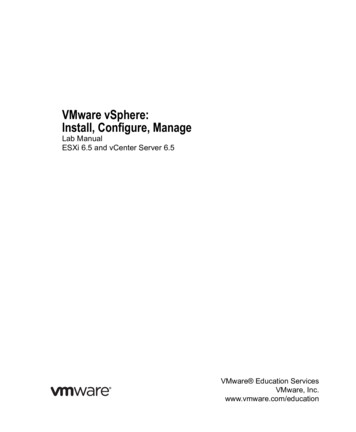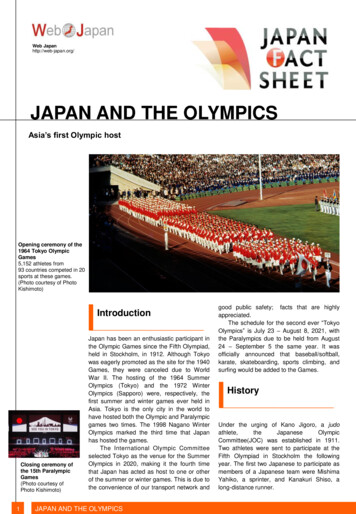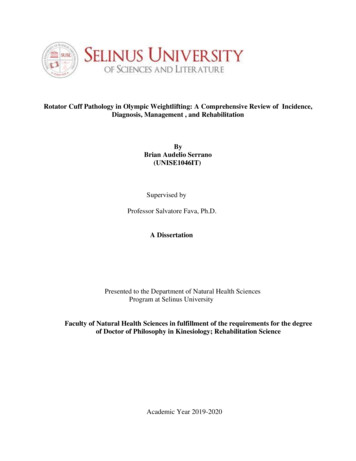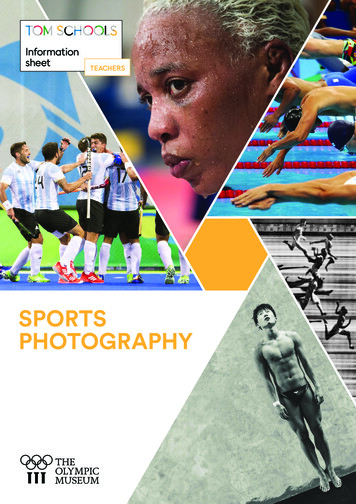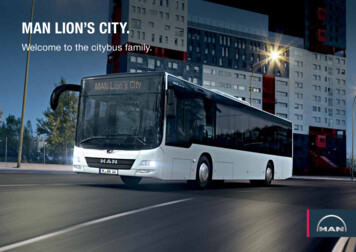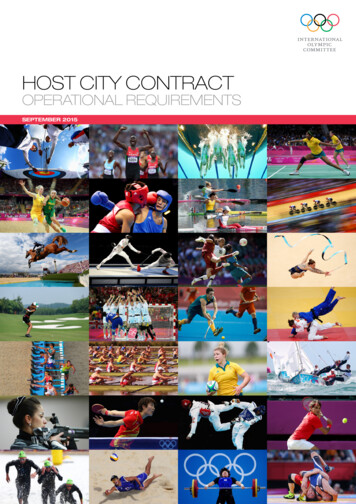
Transcription
HOST CITY CONTRACTOPERATIONAL REQUIREMENTSSEPTEMBER 2015
Host City Contract Operational RequirementsSeptember 2015Host City ContractOperational RequirementsSeptember 2015 International Olympic CommitteeChâteau de Vidy – Route de Vidy 9 - C.P. 356 – CH-1001 Lausanne / Switzerlandwww.olympic.org
Host City Contract Operational RequirementsSeptember 2015This page has been left blank intentionally
Host City Contract Operational RequirementsSeptember 2015Table of contentCodes and Acronyms. 5Foreword. 9Cross-reference matrix . 121. Product and Experience . 141.1.Sport (including IF services) . 151.2.Ceremonies . 261.4.Cultural Olympiad. 381.6.Olympic Torch Relay . 421.3.1.5.City Activities and Live Sites . 35Education programme . 402. Stakeholder Services . 472.1.Mark eting Partner Services . 482.3.NOC Services . 582.5.People Management . 682.2.2.4.Media . 51Olympic Family and Dignitary Services . 623. Venues and Infrastructure . 703.1.Energy . 713.3.Villages Management . 833.2.3.4.Venues . 74Wayfinding Signage . 954. Games Services. 974.1.Accommodation. 98Client Group Accommodation Requirements Table . 103Client Group Accommodation Requirements Table . 1044.2.Accreditation . 1134.4.Food and Beverage . 1184.6.Medical Services. 1214.8.Transport . 1314.3.4.5.4.7.Arrivals and Departures . 115Language Services . 120Technology . 127Page 3 of 273
Host City Contract Operational RequirementsSeptember 20155. Governance . 1475.1.City Operations . 1485.2.Finance. 1495.4.Information and Knowledge Management . 1585.3.5.5.5.6.Games Management . 153Protocol. 161Sustainability and Olympic Legacy . 1676. Commercial and Engagement. 1706.1.Brand, Identity and Look of the Games . 1716.3.Communications . 1806.5.Rights Protection . 1876.2.6.4.6.6.Business Development . 176Digital Media. 183Ticketing . 197Annexes . 203Page 4 of 273
Host City Contract Operational RequirementsSeptember 2015Codes and AcronymsCode/ AcronymsNameAAAAccommodation Allocation als and DeparturesATRAuthorised Ticket ResellerBILBrand, Identity and Look of the GamesBIOBroadcast Information OfficeBMSBuilding Management SystemBRSBroadcastingBUSBusiness DevelopmentCADComputer Aid DesignCASCourt of Arbitration for SportCCCCommunication, Command and ControlCCRCommentary Control RoomsCERCeremoniesCISCommentary Information SystemCOMCommunicationCTYCity OperationsDDPDomestic Dignitary ProgrammeDDSDirect and Dedicated Transportation SystemDIGDigital MediaDOSDirectory of ServicesDRMDelegation Registration MeetingEBExecutive BoardEMRElectronic Medical RecordENGElectronic News GatheringFAFunctional AreaFINFinanceFF&EFurniture, Fixtures and EquipmentFNBFood and BeverageFOPField of PlayGAMGames ManagementHCCHost City ContractIBCInternational Broadcast CentreIDPInternational Dignitary ProgrammeIFInternational FederationIKMInformation and Knowledge ManagementPage 5 of 273
Host City Contract Operational RequirementsSeptember 2015Code/ AcronymsNameIOCInternational Olympic CommitteeIOPPInternational Olympic Photo PoolIPCInternational Paralympic CommitteeISOInternational Organisation for StandardizationITOInternational Technical OfficialISPsInternet Service ProvidersIXPsInternet Exchange PointsJMPAJoint Marketing Plan AgreementLANLanguage ServicesLIVCity Activities and Live SitesLOLPLoss of Load ProbabilityMBCMountain Broadcast CentreMCMedical CommissionMEDMedical ServicesMHEMaterial Handling EquipmentMHQMedical HeadquartersMMCMountain Media CentreMPAMarketing Plan AgreementMPCMain Press CentreMPCPMarketing Partner Coach ProgrammeMPSMarketing Partner ServicesMOUMemorandum of UnderstandingNCSNOC ServicesNFNational FederationNOCNational Olympic CommitteeNPCNational Paralympic CommitteeNRGEnergyNTONational Technical OfficialOBOutside BroadcastOBSOlympic Broadcasting ServicesOCOGOrganising Committee for the Olympic GamesODFOlympic Data FeedOFSOlympic Family and Dignitary ServicesOHCOlympic Hospitality CentreOIACOlympic Identity and Accreditation CardOISOlympic Information ServiceOPPOlympic Presentation PositionORISOlympic Results and Information ServicesOTROlympic Torch RelayPage 6 of 273
Host City Contract Operational RequirementsSeptember 2015Code/ AcronymsNameOVPOlympic Village PlazaPARParalympic GamesPCCProtocol Coordination CentrePEMPeople ManagementPEQParalympic Entries and Qualification SystemPIACParalympic Identity and Accreditation CardPMPAParalympic Marketing Plan AgreementPRISParalympic Results and Information ServicesPRSPressPRTProtocolRHBRights-Holding BroadcasterRPPRights Protection ProgrammeRTDSReal Time Data SystemRZResidential ZoneSEQSport Entries and Qualification SystemSICSport Information CentreSIGWayfinding SignageSPTSportSRSSki Racing Suppliers mmunications Equipment RoomsTKTTicketingTOCTechnical Operations CentreTOKTransfer of KnowledgeTOPThe Olympic PartnerTRATransportVAPPVehicle Access and/ or Parking PermitVAPPSVehicle Access and/ or Parking Permit SchemeVENVenuesVILVillages ManagementVMCVenue Media CentreWADAWorld Anti-Doping AgencyWSFGIWorld Federation of the Sporting Goods IndustryYOGOCYouth Olympic Games Organising CommitteePage 7 of 273
Host City Contract Operational RequirementsSeptember 2015ForewordIntroductiona) PurposeHosting an Olympic Games is the pre-eminent opportunity for a city to promote its image on the worldstage. The IOC selects the host city based on a number of criteria’s, including the city’s ability to usethe Games as a transformative legacy for its citizens for generations to come. The Host City Contractis designed to ensure that all parties understand and agree to a specific set of responsibilities thatguarantee a successful Olympic Games and, create a beneficial legacy for the host city and theOlympic Movement.The Host City Contract - Operational Requirements (the “HCC Operational Requirements”) are animportant part of the Host City Contract, detailing a set of core elements for the project, which provideOlympic quality conditions for the athletes and all participants, while at the same time allowingpotential host cities to responsibly match their Games concepts to their own sport, economic, social,and environmental long-term planning needs.b)Host City Contract for the Games of the XXXIII Olympiad 2024This HCC Operational Requirements have been drafted to apply to the Games of the XXXIII Olympiad2024 (the “Games”). It forms an integral part of the Host City Contract entered into by and between, onthe one part, the International Olympic Committee (the “IOC”) and, on the other part, the host city ofthe Games (the “Host City”) and the National Olympic Committee of the host country of the Games(the “Host NOC”) following the election of the Host City as host city of the Games by the 130th IOCSession in Lima in September 2017.In accordance with the Host City Contract 2024 - Principles, the Host City Contract (the “HCC”)consists of the following documents and commitments, which are all fully binding upon the Parties andwhich, in case of any conflict or discrepancy, will apply in the following order of precedence:a)The Host City Contract 2024 - Principles, including all appendices thereto (the “HCCPrinciples”);b)The HCC - Operational Requirements, including all annexes thereto;c)The Games Delivery Plan (as defined in the HCC Principles);d)The Candidature Commitments (as defined in the HCC Principles); ande)The Olympic Charter.The HCC Principles sets forth the general principles governing the relationship between the IOC, theHost City, the Host NOC and the Organising Committee for the Olympic Games (the “OCOG”), as wellas their respective financial and contractual responsibilities. It also provides the details of thecontribution of the IOC to the success of the Games and the key elements necessary for thepreparation and delivery of the Olympic Games.All provisions of the HCC Principles apply to the HCC Operational Requirements. It is thereforeimportant to read this document in parallel with the HCC Principles as all requirements anddeliverables described herein shall be performed in compliance with the terms and conditions of theHCC Principles.The HCC Operational Requirements lists key requirements applicable to the planning, organising,Page 9 of 273
Host City Contract Operational RequirementsSeptember 2015financing and staging of the Games, as they are known by the Parties at the time of execution of theHCC. However, these requirements may be amended or completed as a result of policy, technologicaland other changes, in accordance with the procedures and subject to the conditions described in theHCC Principles.c)Relationship with the Olympic CharterIn accordance with the HCC Principles, the requirements and deliverables contained therein must alsobe performed in accordance with the Olympic Charter. The Olympic Charter is the constitutivedocument of the Olympic Movement. As such, it defines the fundamental principles of Olympism andthe rules and bye-laws adopted by the IOC, governs the organisation, actions and functioning of theOlympic Movement and establishes the conditions for the celebration of the Olympic Games.d)Games Delivery PlanPursuant to the HCC Principles, the Parties will agree on the main milestones and timelines to berespected in the performance of their requirements under the HCC, within 18 months following theexecution of the HCC. These timelines and milestones will be featured in the “Games Delivery Plan”which fully applies to the requirements and deliverables defined in the present HCC OperationalRequirements. Before the Games Delivery Plan is finalized, the milestones and timelines included inthe IOC generic Delivery Plan will apply.e)Other important documentsIn accordance with the HCC Principles, certain other agreements or documents referred to in the HCCwill apply to the planning, organising, financing and staging of the Games. This includes, in particular,the Marketing Plan Agreement, or MPA, the cooperation agreement to be concluded between theOCOG and the Host Broadcaster of the Games (OBS), and the agreement between the IOC and theInternational Paralympic Committee (IPC), all referred to in the HCC Principles. The provisions ofthese agreements and other documents referred to in the HCC Principles apply to the performance ofthe requirements included in the HCC Operational Requirements.f) DefinitionsAll capitalized terms, which are not otherwise defined in the present HCC Operational Requirementsdocument, shall have the meaning attributed to such terms in the HCC Principles.Structure and scope of this documentg) Operational areasThe requirements contained in the HCC Operational Requirements are grouped together into subjectmatters, referred to as “areas”, with an introductory description of each area. The OperationalRequirements are provided in a numbered list for easy reference.It should be noted that the grouping of requirements into areas is designed to assist the Gamesorganisers by offering a rational allocation of the various tasks and responsibilities covered by theHCC. However, for clarity, this presentation is not intended to impose any defined organisationalstructure upon the OCOG.Many areas addressed in this document focus on the provision by the OCOG of certain facilities,goods or services to the IOC, IOC Controlled Entities or other categories of Games stakeholders (e.g.athletes, National Olympic Committees, International Federations, media, IOC Marketing Partners,Rights-Holding Broadcasters, domestic and international dignitaries and spectators),. Such facilities,goods or services shall be provided in accordance with the parameters defined in the HCC Principles,Page 10 of 273
Host City Contract Operational RequirementsSeptember 2015the MPA, thepursuant to theotherwise suchOCOG’s cost,stakeholders.Broadcasting Cooperation Agreement entered into between the OCOG and OBSHCC Principles and other relevant agreements or documents. Unless expressly statedservices and facilities shall be provided to the relevant stakeholders group at theand without the OCOG requesting any financial compensation from the relevantIn order to ensure the same level of services to everyone – with or without impairments – universalaccessibility is a core principle which should apply to all venues and services for the benefit of Gamesparticipants and spectators, as well as the host City’s community.h) Paralympic GamesThe Paralympic Games represent the ultimate international multi-sport competition for athletes with animpairment that reflects the highest standards of athletic excellence and diversity.The 2024 Paralympic Games shall be organised in accordance with the relevant provisions containedin the HCC, this HCC Operational Requirements document and with the agreement signed betweenthe IOC and the IPC. This agreement includes the guarantees, conditions and principles to sustain theParalympic Games as an international multi-sport, multi-disability Games that are organised by OCOGusing the Olympic Games infrastructure and services. It specifies the marketing and broadcastingrights granted to OCOGs and the payment guarantees that are given to the IPC for those rights aswell as the stakeholders’ responsibilities with respect to the Paralympic Games. The services providedto the participants in the Paralympic Games should be based upon similar principles to thoseapplicable to the Olympic Games but scaled to the needs of the Paralympic Games. The planning ofthe Paralympic Games should be integrated into the Olympic Games planning by the OCOG from theearly stages.In order to provide the OCOG with a complete understanding of a given area and to promote anintegrated planning approach, the majority of requirements related to the Paralympic Games havebeen integrated within the various sections of this document. As a result most requirements of generalnature contained in this document apply to both Olympic and Paralympic Games (even though thismay not be systematically mentioned), while Paralympic-specific requirements can be identified via thewording of each relevant requirement and/ or at the end of several sections. If no Paralympic specificsare referred to, the Olympic standards will also be used as a basis for discussion regarding theParalympic standards in that given area.i) Cooperation between the OCOG, the Host City, the Host NOC and otherstakeholders of the Host CountryA combined effort and a close cooperation by the Host City and the Host NOC, as well as HostCountry Authorities or other private institutions of the Host Country are essential to the success of theGames. However in accordance with the mission of the OCOG, as described in the HCC Principles, tocarry out all operational aspects of the planning, organising, financing and staging of the Games, thepresent HCC Operational Requirements document is focusing on the performance of the differentGames-related requirements by the OCOG.j) Application to other editions of the Olympic Games or Olympic WinterGamesThe requirements defined in this document have been drafted primarily in view of their application tothe Games, as an integral part of the HCC. However, the IOC may decide, in coordination withexisting OCOGs, that the requirements contained in this document are, in whole or in part, alsoapplicable to earlier editions of the Games of the Olympiad or Olympic Winter Games and/ or, inaccordance with the provisions of the agreements entered into between the IOC and existingOCOGs.Page 11 of 273
Host City Contract Operational RequirementsSeptember 2015Cross-reference matrixThe following table is meant to provide a visual aid to the reader with regard to the areas that areclosely related and where close coordination is particularly essential. While this HCC OperationalRequirements document remains binding upon the OCOG, the Host City and the Host NOC in itsentirety, it is highly recommended that specific attention be paid to the requirements set forth in theother dependent areas so that the overall context in which the activities will be carried out are fullyunderstood.Page 12 of 273
Host City Contract Operational RequirementsSeptember 2015Responsible AreasDependent Areas (that need to be considered by the responsible areas)(for the delivery of their obligations)CodeSportSPTCeremoniesCERCity Activities and Live SitesLIVSPT CER LIV Cultural OlympiadCULEducation programmeEDUOlympic Torch RelayOTRMarketing Partner ServicesMPS Media - PressPRS Media - BroadcastBRS NOC ServicesNCS Olympic Family and Dignitary ServicesOFS People ManagementPEM EnergyNRG VenuesVEN Villages Management CUL EDU OTR MPS PRS BRS NCS OFS PEM NRG VEN TransportTRACity OperationsCTY FinanceFIN GAM Information and Knowledge ManagementIKM ProtocolPRT Sustainability and Olympic LegaySUS BIL Business DevelopmentBUSCommunication TKT Ticketing RPP TEC BUS COM DIG RPP TKT MED Technology Medical Services LAN FNB Language Services Food and Beverage Rights Protection AND ACR Arrivals and Departures Accreditation DIG COM SIGDigital Media ACM VIL SIG ACM ACR AND FNB LAN MED TEC TRA CTY FIN GAM IKM PRT SUS BIL VIL AccommodationBrand, Identity and Look of the Games Wayfinding SignageGames Management Page 13 of 273
Host City Contract Operational RequirementsSeptember 20151.Product and ExperiencePage 14 of 273
Host City Contract Operational RequirementsSeptember 20151.1.Sport (including IF services)IntroductionThe Olympic Games are the pinnacle sporting event in the world, gathering the best athletes fromaround the globe and attracting millions of spectators within the venues and billions more viaworldwide broadcast coverage. Within the OCOG, the Sport area is responsible for: ensuring athletes’ needs are at the heart of operational planning;delivering exceptional and world class sport competitions;ensuring athletes are provided with the best environments and opportunities to train andcompete;building and managing relationships with IFs and National Federation (NFs).The Sport team is the primary source of all information relating to the sports on the Olympicprogramme and the requirements of the athletes and IFs. It therefore has a responsibility to inform andeducate all Functional Areas (FAs) within the OCOG, as well as external parties involved in theprovision of services for the athletes and IFs.The relationship between the Sport area and the IFs is one of the key partnerships in the organisationof the Olympic Games, owing to the number of crucial areas impacting the success of the sportingcompetitions and athletes’ experience in which the IFs provide indispensable input, feedback andapprovals. IFs provide key expertise, experience and resources in order to support the OCOG instaging first-class sport competitions. IFs also determine the rules, regulations and requirements fortheir respective sports, which the OCOG in turn implements. It is important that the OCOG and the IFwork together to deliver the sporting competitions in the most efficient and cost effective way.The goal of the Paralympic sport programme is to allow athletes to inspire and excite the worldthrough their athletic performances, in accordance with the vision of the IPC. Therefore, the role of theSport area remains similar for the Paralympic Games, with the addition of some services andoperations that are unique, such as classification and orthotic, prosthetic and wheelchair repairservices.The Sport area is closely related and interlinked with many other areas covered by the HCCOperational Requirements. When planning and delivering the Games, it is important that the OCOGconsiders the Games as a whole, and it is strongly advised to pay specific attention to therequirements for all related areas highlighted in the cross-reference matrix at the beginning of thisdocument.More information on how to deliver the requirements contained in this section is included in theOlympic Games Guide on Sport.Page 15 of 273
Host City Contract Operational RequirementsSeptember 2015Operational RequirementsIn order to deliver the Sport requirements in line with the introduction above and in accordance withthe HCC Principles, the following shall be implemented by the OCOG within the milestones and othertimelines set out in the Games Delivery Plan:SPT 01 As a general principle, ensure that all sports competitions take place in the host city of theOlympic Games. Pursuant to the Olympic Charter, the IOC may allow the organisation ofpreliminary competitions, or even entire sports or disciplines, outside the host city or, inexceptional cases, outside the host country, notably for reasons of sustainability and geography.SPT 02 Duration of competitionsEnsure that the duration of the competitions of the Olympic Games does not exceed 16 days (thisrule does not apply to football). In exceptional circumstances, some preliminaries may beorganised prior to the Opening Ceremony, upon approval of the respective IF and the IOC. In anycase, no medals may be awarded and no athletes eliminated from the Olympic Games prior tothe Opening Ceremony.SPT 03 Location of sportsOrganisation of Paralympic sportsDeliver sports organisation for the Paralympic Games as per the technical requirementsestablished by the IPC and the IFs in required areas including the following: define the locations, designs and operational plans for each competition, training andclassification venue;establish the detailed competition, training and classification schedules;procure the necessary types and quantities of equipment for competition, training andclassification purposes;host between two and five visits of the appointed technical personnel for each sport in orderto contribute to the planning, monitoring, preparations and issue-resolution leading up to theParalympic Games. The exact number of visits is contextual and depends on the sport, thevenue and the synergies with visits for the Olympic sport, if relevant;provide required technical installations and systems for Paralympic results and informationdissemination; andcoordinate the creative concepts and logistical arrangements for the sport presentationelements.Requirements related to competition and training venuesSPT 04 IF venue standardsFollow the most current IF technical requirements as they relate to competition venues for eachsport (e.g. standard field of play (FOP) dimensions, standard warm-up space needed, standardback-of-house requirements for athletes’ preparation and IF spaces, including working areas), asdefined in relevant sport-specific and venue-specific documentation provided by each IF.Page 16 of 273
Host City Contract Operational RequirementsSeptember 2015SPT 05 Ensure that the prior approval of the IOC and of the respective IF is obtained before anymodification of the location and key venue requirements, as proposed by the Host City and theHost NOC in their candidature documents, is implemented. Any change of competition venuemust enhance the Candidate City proposals, and the legacy aspect of the Games concept.SPT 06 Competition venuesParalympic competition venuesProvide a high standard of equipped competition venues meeting the IF requirements for allsports/ disciplines on the Paralympic sport programme. As a rule, all the competition venues usedfor the Paralympic Games shall be those used for the Olympic Games; any exception to thisshould be due to important reasons and is subject to IPC approval.SPT 07 -Look of the Games Consult IFs on all Look of the Games elements in and around the FOP at their respectivecompetition venues. This is especially important for sports which have specific issues withbackground colours affecting sighting on the FOP. Supply each training venue with a package of wayfinding signage, flags and banners that are inline with the Look of the Games.SPT 08 -Olympic flag and IF recognition Ensure that the Olympic flag flies over each competition and training venue throughout theOlympic Games, with the IF flag positioned between the Olympic flag and the OCOG flag. Ensure that additional IF recognition is placed next to the FOP at all competition venues. The sizeand shape shall be decided by the IOC and implemented by the OCOG.SPT 09 Pre-Games access to venuesEnsure a minimum level of pre-Games venue access to NOCs, based on the rules andregulations of the sports concerned.SPT 10 -Games-time training Agree with each relevant IF on all technical requirements relating to the training venues identifiedfor use before and during the Olympic Games and make these training venues available for allathletes from the opening of the Olympic Village until the end of competition for all sports(including for sports held in co-host cities).
Building Management System : BRS Broadcasting BUS . Business Development . September 2015 Code/ Acronyms Name IOC . International Olympic Committee . IOPP International Olympic Photo Pool IPC : International Paralympic Committee . ISO International Organisation for Standardization ITO : International Technical Official . ISPs Internet Service .


